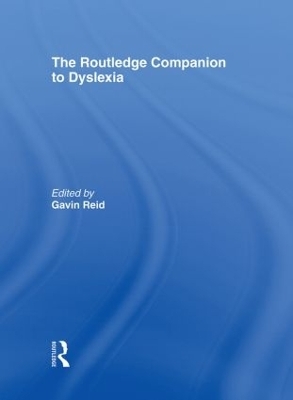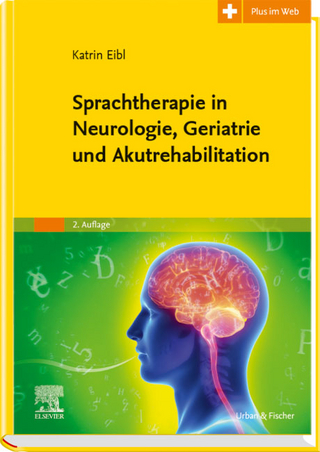
The Routledge Companion to Dyslexia
Routledge (Verlag)
978-0-415-43078-4 (ISBN)
The Routledge Companion to Dyslexia is a ground-breaking analysis of the whole field of dyslexia by a distinguished team of international contributors and editors, engaged in literacy, inclusion and learning. Their diverse perspectives and wide expertise make this invaluable guide one of the most important additions to the field of dyslexia for over a decade.
Dyslexia is without doubt the most high profile and contentious learning difficulty, and it is a topic that has attracted a vast amount of research, opinion, professional schisms, and debate. The Companion provides an invaluable overview of the field of dyslexia with vital and clear emphasis on linking theoretical perspectives with best practice. This accessible text:
presents a survey of current and future development in research, with a focus on how research can inform practice
focuses on areas such as neurobiology, phonological processing, literacy acquisition, numeracy and multilingualism
considers assessment and identification, with contributions on early identification, reading, spelling and mathematics
addresses identifying and meeting needs in an inclusive context
discusses inclusion and barriers to learning in a variety of different national contexts
includes models of instruction, direct instruction, co-operative learning and cross-curricular learning.
The Routledge Companion to Dyslexia is a superb resource for anyone interested in the subject, whether in education or related subjects such as psychology or neurology. Fully indexed and cross-referenced, with helpful further reading sections at the end of each entry, it is ideal for those coming to the field of dyslexia for the first time as well as students and practitioners already familiar with the subject.
Gavin Reid, formerly a senior lecturer at Moray House School of Education, University of Edinburgh, is now a consultant to the Centre for Child Evaluation and Teaching in Kuwait, Red Rose School in the UK and REACH Learning Center in Vancouver.
Part 1: Research - Current and Future Developments 1. Dyslexia - An Overview of Recent Research 2. Dyslexia and IQ: From Research to Practice 3. Dyslexia and Cognitive Skills 4. Dyslexia and Glue Ear Syndrome 5. Visual Stress and Dyslexia Part 2: Dimensions of Dyslexia 6. The Role of Early Identification – Models from Practice 7. The Role of Early Identification – Models from Research and Practice 8. Identification and Assessment of Dyslexia and Planning for Learning 9. Extending Literacy Skills – Issues for Practice 10. Spelling: Development, Assessment and Instruction 11. Dyscalculia and Learning Difficulties in Mathematics 12. Phonological Awareness in Reading Disabilities Remediation: Some General Issues 13. Alternative and Innovative Interventions for Dyslexia – A Critical Commentary Part 3: Identifying and Meeting Needs in an Inclusive Context: Inclusion and the Barriers to Learning 14. How Compatible is the Recognition of Dyslexia with Inclusive Education? 15. Identifying and Overcoming the Barriers to Learning in an Inclusive Context 16. Dyslexia in the Secondary School: Improving Whole School Achievement Through Dyslexia Aware Best Practice 17. School-wide Professional Development to Raise Students’ Literacy Levels at Clyde Quay School, Wellington, New Zealand 18. Dyslexia: Overcoming the Barriers of Transition 19. Overcoming the Barriers to Literacy: An Integrated, Contextual Workshop Approach 20. The Implications of Students' Perspectives on Dyslexia for School Improvement Part 4: Identifying and Meeting Needs in Further, Higher Education and the Workplace 21. The Development of Protocols for Assessment and Intervention at University for Students with Dyslexia 22. Reading Comprehension Solutions for College Students with Dyslexia in an Era of Technology: An Integrated Approach 23. Dyslexia: Meeting the Needs of Employers and Employees in the Workplace Part 5: Diversity, Culture and Language 24. Dyslexia and Foreign Language Learning 25. Reading and Dyslexia in Arabic 26. Reading and Reading Disabilities in Spanish and Spanish-English Contexts 27. Responsive Approaches to Literacy Learning Within Cultural Contexts
| Erscheint lt. Verlag | 5.3.2009 |
|---|---|
| Zusatzinfo | 4 Tables, black and white |
| Verlagsort | London |
| Sprache | englisch |
| Maße | 174 x 246 mm |
| Gewicht | 870 g |
| Themenwelt | Medizin / Pharmazie ► Gesundheitsfachberufe ► Logopädie |
| ISBN-10 | 0-415-43078-X / 041543078X |
| ISBN-13 | 978-0-415-43078-4 / 9780415430784 |
| Zustand | Neuware |
| Haben Sie eine Frage zum Produkt? |
aus dem Bereich


